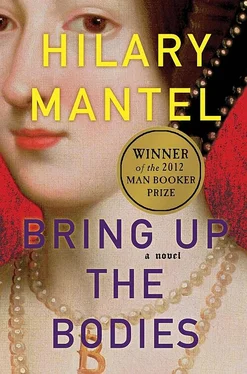He is amazed. ‘What? Walter? Walter did?’
‘He didn’t pay much. They had other children.’
‘Even so.’ He had stood dumbfounded. Walter. Walter paid them off. Walter, who never gave him anything more than a kick.
Gardiner laughed. ‘You see. I know things about your life you don’t know yourself.’
* * *
It is late now; he will finish up at his desk, then go to his cabinet to read. Before him is an inventory from the abbey at Worcester. His men are thorough; everything is here, from a fireball to warm the hands to a mortar for crushing garlic. And a chasuble of changeable satin, an alb of cloth of gold, the Lamb of God cut out in black silk; an ivory comb, a brass lamp, three leather bottles and a scythe; psalm books, song books, six fox-nets with bells, two wheelbarrows, sundry shovels and spades, some relics of St Ursula and her eleven thousand virgins, together with St Oswald’s mitre and a stack of trestle tables.
These are sounds of Austin Friars, in the autumn of 1535: the singing children rehearsing a motet, breaking off, beginning again. The voices of these children, small boys, calling out to each other from staircases, and nearer at hand the scrabbling of dogs’ paws on the boards. The chink of gold pieces into a chest. The susurration, tapestry-muffled, of polyglot conversation. The whisper of ink across paper. Beyond the walls the noises of the city: the milling of the crowds at his gate, distant cries from the river. His inner monologue, running on, soft-voiced: it is in public rooms that he thinks of the cardinal, his footsteps echoing in lofty vaulted chambers. It is in private spaces that he thinks of his wife Elizabeth. She is a blur now in his mind, a whisk of skirts around a corner. That last morning of her life, as he left the house he thought he saw her following him, caught a flash of her white cap. He had half turned, saying to her, ‘Go back to bed’: but no one was there. By the time he came home that night her jaw was bound and there were candles at her head and feet.
It was only a year before his girls died of the same cause. In his house at Stepney he keeps in a locked box their necklaces of pearl and coral, Anne’s copy books with her Latin exercises. And in the store room where they keep their play costumes for Christmas, he still has the wings made of peacock feathers that Grace wore in a parish play. After the play she walked upstairs, still in her wings; frost glittered at the window. I am going to say my prayers, she said: walking away from him, furled in her feathers, fading into dusk.
And now night falls on Austin Friars. Snap of bolts, click of key in lock, rattle of strong chain across wicket, and the great bar fallen across the main gate. The boy Dick Purser lets out the watchdogs. They pounce and race, they snap at the moonlight, they flop under the fruit trees, heads on paws and ears twitching. When the house is quiet – when all his houses are quiet – then dead people walk about on the stairs.
Anne the queen sends for him to her own chamber; it is after supper. Only a step for him, as at every major palace rooms are reserved for him now, near the king’s. Just a staircase: and there, with the light of a sconce lapping at its gold trim, is the stiff new doublet of Mark Smeaton. Mark himself is lurking inside it.
What brings Mark here? He is without musical instruments as an excuse, and he is got up as gorgeously as any of the young lords who wait on Anne. Is there justice? he wonders. Mark does naught and gets more bonny each time I see him, and I do everything and get more grey and paunchy by the day.
Since unpleasantness usually ensues between them, it is in his mind to pass by with a nod, but Mark stands up straight and smiles: ‘Lord Cromwell, how are you?’
‘Ah, no,’ he says. ‘Still plain master.’
‘It is a natural mistake. You seem every inch the lord. And surely, the king will do something for you soon.’
‘Perhaps not. He needs me in the House of Commons.’
‘Even so,’ the boy murmurs, ‘it would seem ungracious in him, when others are rewarded for much less service. Tell me, they say you have got music scholars in your house?’
A dozen or so merry little boys, saved from the cloister. They work at their books and practise their instruments, and at table they learn their manners; at supper they entertain his guests. They practise with the bow, and play fetch with the spaniels, and the littlest ones drag their hobby horses over the cobbles, and follow him about, sir, sir, sir, look at me, do you want to see me stand on my hands? ‘They keep the household lively,’ he says.
‘If you should ever want someone to put a polish on their performance, think of me.’
‘I will, Mark.’ He thinks, I wouldn’t trust you around my little boys.
‘You will find the queen discontented,’ the young man says. ‘You know her brother Rochford has lately gone into France on a special embassy, and today he has sent a letter; it seems to be the common talk over there that Katherine has been writing to the Pope, asking him to put into effect that wicked sentence of excommunication he has pronounced against our master. And which would result in untold hurts and perils to our realm.’ He nods, yes, yes, yes; he does not need Mark to tell him what excommunication is; can he not make it short? ‘The queen is angry,’ the boy says, ‘for if this is so, Katherine is a plain traitor, and the queen wonders, why do we not act against her?’
‘Suppose I tell you the reason, Mark? Would you take it in to her? It seems you could save me an hour or two.’
‘If you would entrust me –’ the boy begins; then sees his cold smile. He blushes.
‘I’d trust you with a motet, Mark. Although.’ He looks at him thoughtfully. ‘It does seem to me that you must stand high in the queen’s favour.’
‘Master Secretary, I believe that I do.’ Flattened, Mark is already bouncing back. ‘It is we lesser men, often, who are most fit for royal confidence.’
‘Well then. Baron Smeaton, eh, before long? I shall be the first to congratulate you. Even if I am still toiling on the benches of the Commons.’
* * *
With a whisk of her hand, Anne shoos away the ladies around her, who bob to him and whisper out. Her sister-in-law, George’s wife, lingers: Anne says, ‘Thank you, Lady Rochford, I shall not need you again tonight.’
Only her fool stays with her: a dwarf woman, peeping at him from behind the queen’s chair. Anne’s hair is loose beneath a cap of silver tissue shaped like a crescent moon. He makes a mental note of it; the women about him always enquire what Anne is wearing. This is how she receives her husband, the dark tresses displayed only for him, and incidentally for Cromwell, who is a tradesman’s son and doesn’t matter, any more than the boy Mark does.
She begins, as she often does, as if in the middle of a sentence. ‘So I want you to go. Up-country to see her. Very secret. Only take the men you need. Here, you may read my brother Rochford’s letter.’ She flourishes it at her fingers’ ends, then changes her mind, whips it back. ‘Or…no,’ she says, and decides to sit on it instead. Perhaps, amid the news, it contains dispraise of Thomas Cromwell? ‘I am very suspicious of Katherine, very suspicious. It seems they know in France what we only guess at. Your people are not vigilant, perhaps? My lord brother believes the queen is urging the Emperor to invade, as is the ambassador Chapuys, who by the way should be banished this kingdom.’
‘Well, you know,’ he says. ‘We can’t go throwing ambassadors out. Because then we don’t get to know anything at all.’
Truth is, he is not afraid of Katherine’s intrigues: the mood between France and the Empire is at the moment unremittingly hostile, and if open war breaks out, the Emperor will have no troops to spare for invading England. These things swing about in a week, and the Boleyn reading of any situation, he has noticed, is always a little behind the times, and influenced by the fact that they pretend to have special friends at the Valois court. Anne is still in pursuit of a royal marriage for her ginger little daughter. He used to admire her as a person who learned from her mistakes, who would pull back, re-calculate; but she has a streak of stubbornness to equal that of Katherine, the old queen, and it seems in this matter she will never learn. George Boleyn has been over to France again, intriguing for the match, but with no result. What’s George Boleyn for ? That’s a question he asks himself. He says, ‘Highness, the king could not compromise his honour by any ill-treatment of the queen that was. If it became known, it would be a personal embarrassment to him.’
Читать дальше
Конец ознакомительного отрывка
Купить книгу












